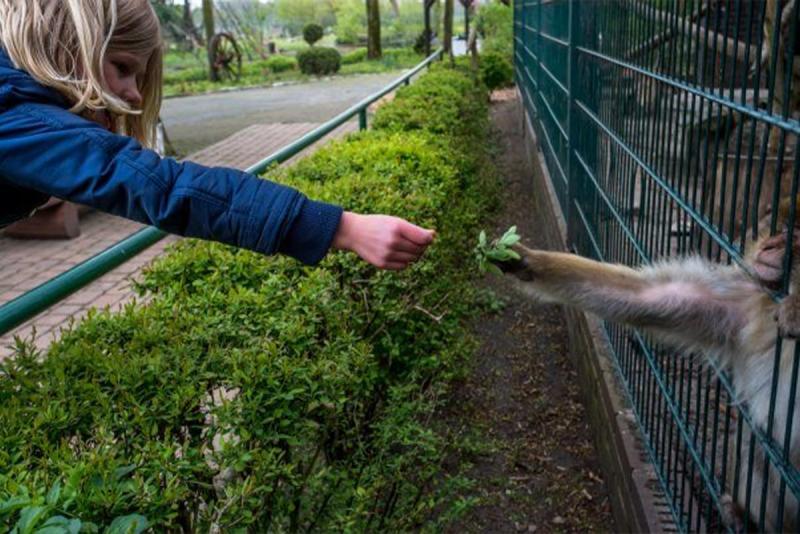Understanding Animal Emotion & Cognition
GSSW’s new Institute for Animal Sentience & Protection will advance the protection of nonhuman animals

In honor of noted conservationist Jane Goodall’s 90th birthday, Colorado Gov. Jared Polis recently signed a proclamation declaring April 3 as “Animals Matter Day.” The proclamation — the first of its kind in the United States — was written by Sonya Zielinski, a University of Denver Graduate School of Social Work (GSSW) MSW student and inaugural intern at the University’s new Institute for Animal Sentience and Protection.
Launched in 2022, the institute is a joint program of GSSW and the Sturm College of Law and is co-directed by social work Clinical Professor Philip Tedeschi and law Professor Justin Marceau, Brooks Institute Faculty Research Scholar of Animal Law and Policy and faculty director of the Animal Law Program. Founded with financial support from Robert Brinkmann, PhD, DVM, the institute aims to expand the scientific understanding of the cognitive and emotional capabilities of nonhuman animals and meaningfully advance their protection.
"To the best of my knowledge, this collaboration between a law school and a school of social work around issues of animal sentience is unique and speaks to the ability of DU to be a thought leader in the world of animal protection," Marceau says.
The institute complements GSSW’s Institute for Human–Animal Connection, which is primarily focused on studying the relationship between people and nonhuman animals. “The new institute will help us navigate the complexities and urgency of the issues involved in the legal and social standing of animals in our world,” Tedeschi explains. “One of the fundamental aspects is to invite deeper understanding of nonhumans and incentivize investigations into animal sentience — their capacity for feelings, complex emotions and cognition.”
In April 2024, a group of leading global scientists signed the New York Declaration on Animal Consciousness, acknowledging that a wide range of nonhuman animals are likely conscious and able to subjectively experience the world. The emerging science of sentience requires humans to always start with the assumption that all animals have consciousness, including invertebrates and insects, Tedeschi says. That core assumption, he notes, should influence policymaking and the moral compass of humans.
“I hope that the social work field adopts the perspective that there are other parts of this world that have to be seen and considered — that nonhumans and nature should also have legal protections, deserving of considerations for respect, equity and justice,” Tedeschi says.
Zielinski agrees. “To separate nonhuman animals from humans in the field of social work is akin to trying to separate physical and mental health: The two are interdependent,” she says. “Similarly, I believe that our ability to empathize with, feel compassion for and protect animals from harm reflects on the health of our own psyche. The prioritization of some living beings over others is an echo of prioritizing some human beings over others, which is inherently pathological.”
“When we start to explore the intersections of harmful and oppressive systems, many of these pressures run together or are identical” for humans and nonhuman animals, Tedeschi adds. “Our recognition of the inextricable connection and challenges to well-being impacting humans, nonhumans and nature reminds us that we are in this together. The institute design of collaboration between the fields of social work and law intentionally centers interspecies justice.”
Notably, Tedeschi adds, the institute doesn’t just center well-being at the species level — the experience and well-being of individual sentient beings is just as important.
Since its founding, the institute has focused on deeply studying the questions related to animal cognition and emotion and beginning to define the scope of its work. The institute is interested in creating tools to document animal sentience and establishing a policy center to influence better governance, more informed leaders and better legislation, Tedeschi says. For instance, the institute held a conference focused on promotion of insect sentience and protection, reinforcing the momentum occurring this year as Colorado passed legislation affording insects the the same protections as other wildlife.
"We’re beginning to build a research agenda that will start to ask deeper questions about our moral responsibility to other animals,” Tedeschi adds. For example, he says, animals are considered property in the United States —“they’re not individuals who have any legal standing at all.” If animals are sentient, he asks, is it appropriate to simply view them as property? “Your dog isn’t the same as your couch, but legally speaking they are. Morally and scientifically, we’re obligated to confront this faulty framework and examine the alternatives."
Such questions have wide-ranging moral, social, legal and economic implications that must also be considered.
The institute addresses both contemporary and future-focused social work issues, says Tedeschi, who looks to students like Zielinski — who is specializing in ecological justice and mental health — to bring “more innovation, more commitment, more focused understanding of the intersection between people and animals” to the field.
“Imagine living in a world where we didn’t have relationships with anyone other than human beings. It would be a lonely one,” Tedeschi says. “One of the most important things about this institute is that we’re at a critical time: We’re in the Anthropocene — a time of human-driven extinction. If we’re really willing to look at these issues, this without question will be one of the most important places for social work to engage.”




